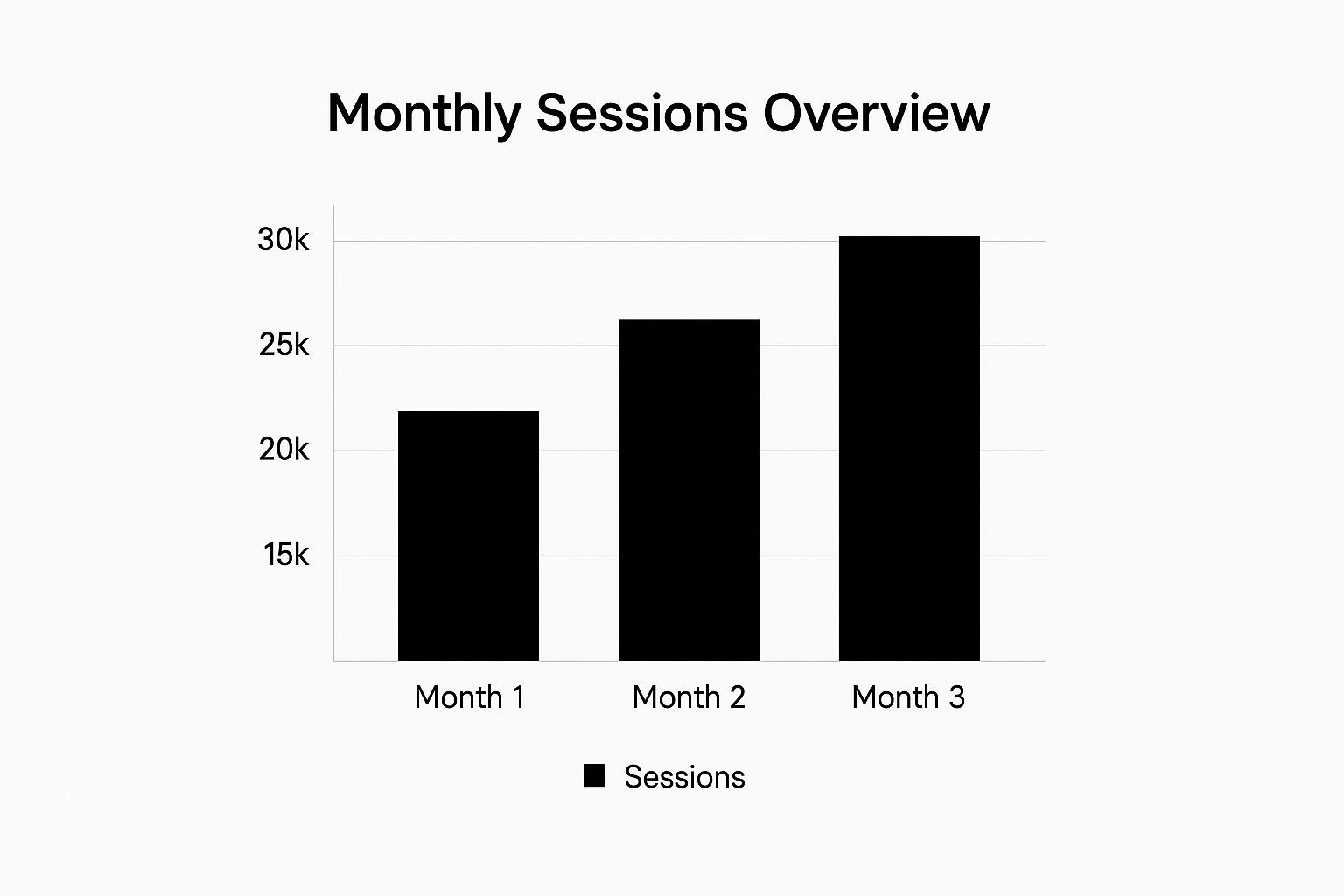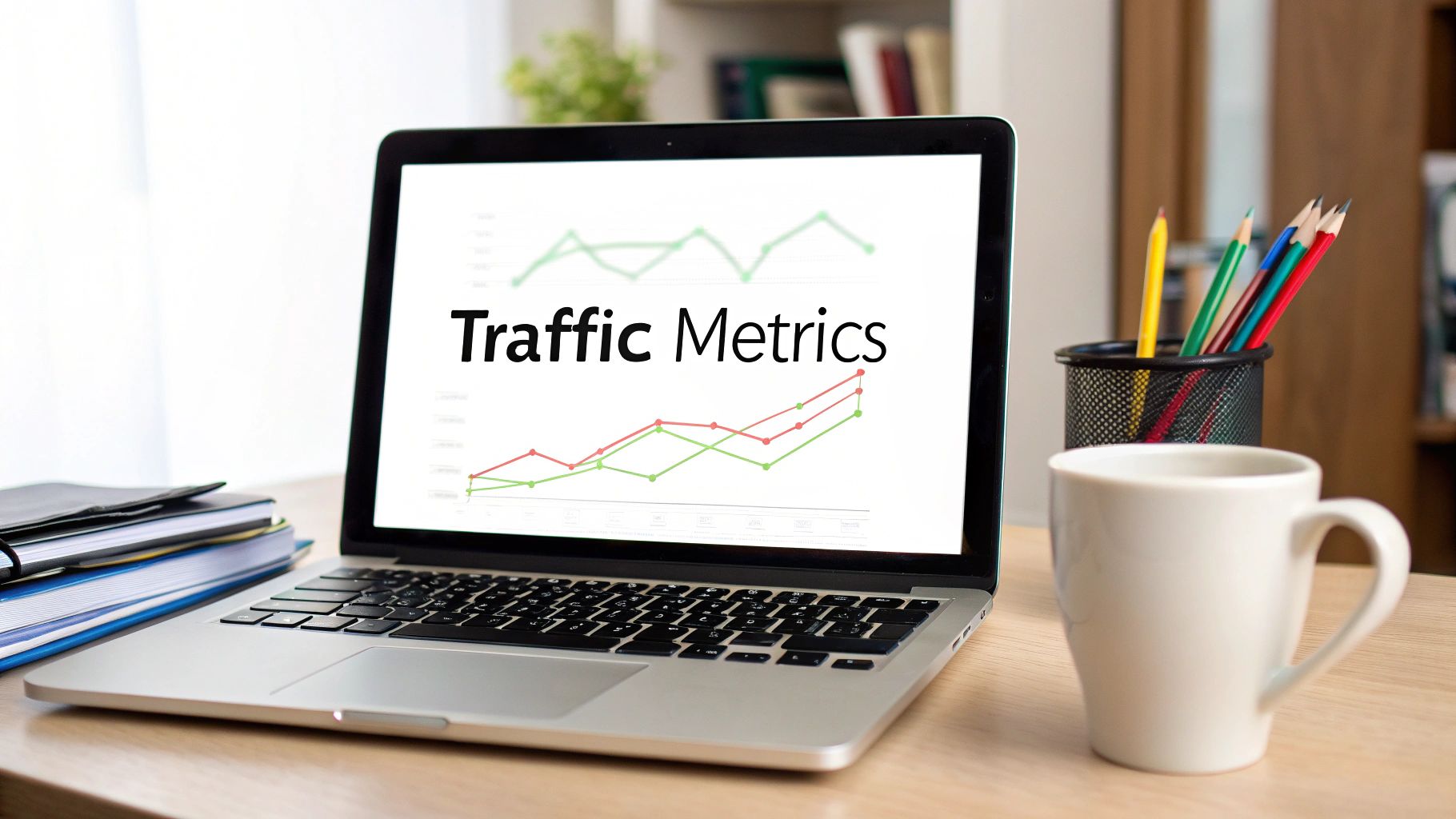Building Your Foundation With The Right Template Approach
Choosing the right monthly SEO report template is crucial for effective communication. A well-structured template ensures clear and logical data presentation, facilitating informed decision-making. This moves beyond simple data dumps to craft a narrative that resonates with your audience. Visualizing key metrics, like website sessions, with a simple infographic can be very effective.

The chart above shows a steady increase in monthly sessions, from 20k in Month 1 to 30k in Month 3. This positive trend suggests the implemented SEO strategies are driving more users to the website. A good template showcases such growth and offers customization options for various business needs. A comprehensive monthly report template is crucial in SEO for tracking and analyzing performance metrics. A well-designed template should include sections for organic traffic, keyword performance, and backlink analysis. An organic traffic overview might display metrics like total sessions, new users, and traffic sources, comparing performance against previous periods to identify trends. Learn more about SEO reports from WriteSonic.
Choosing The Right Template Structure
The structure of your monthly SEO report template impacts its readability and effectiveness. A logical flow ensures stakeholders grasp key insights and understand the data's story. Several structural approaches exist:
- Chronological: Presents data in a time-based sequence, showcasing progress over time.
- Categorical: Groups related metrics, such as keyword performance or backlink profile data.
- Problem/Solution: Highlights challenges and presents corresponding data-driven solutions.
The best structure depends on your objectives and audience. Further information on creating SEO reports can be found at That Is Rank. Effective templates emphasize clear headings, concise summaries, and impactful visualizations.
Essential Components Of A Monthly SEO Report Template
While specifics vary based on individual goals, certain elements are fundamental to an effective monthly SEO report template. These form a foundation for tracking progress and identifying areas for improvement:
- Executive Summary: A concise overview of performance highlights and actionable insights.
- Organic Traffic Analysis: An in-depth look at traffic sources, user behavior, and conversion trends.
- Keyword Performance Tracking: Monitors keyword rankings, search visibility, and click-through rates.
- Backlink Profile Analysis: Assesses the quantity and quality of backlinks.
- Technical SEO Audit Overview: Identifies and addresses technical issues impacting SEO performance.
- Competitor Analysis (Optional): Benchmarks performance against competitors.
These components, combined with a clear structure, enable you to present a compelling narrative based on your SEO data.
To further understand the varying priorities for different organizations, consider the following table:
The following table outlines the essential sections of a monthly SEO report and their priority levels for various organization types.
| Section | Small Business Priority | Enterprise Priority | Agency Priority | Key Metrics |
|---|---|---|---|---|
| Executive Summary | High | High | High | Overall performance summary, key achievements, and areas for improvement |
| Organic Traffic Analysis | High | High | High | Website traffic, traffic sources, user behavior |
| Keyword Performance Tracking | High | High | High | Keyword rankings, search visibility, click-through rate |
| Backlink Profile Analysis | Medium | High | High | Number of backlinks, backlink quality, referring domains |
| Technical SEO Audit Overview | Medium | High | High | Crawl errors, site speed, mobile-friendliness |
| Competitor Analysis | Low | Medium | Medium | Competitor rankings, market share, backlink profile |
This table highlights how different organizations prioritize various aspects of their SEO reports. Small businesses may focus on core metrics like organic traffic and keyword performance, while enterprises and agencies often place more emphasis on technical SEO and competitor analysis. Understanding these priorities can help tailor your reports to specific needs and ensure they provide the most relevant information.
Essential Metrics That Drive Real Business Impact
Not all metrics hold the same weight. Selecting the right Key Performance Indicators (KPIs) for your monthly SEO report template is vital for showcasing the value of your SEO strategy. This means choosing metrics that resonate with stakeholders and demonstrate a clear link to business goals. Focusing on these essential metrics builds trust and reinforces the importance of continued SEO investment.
Prioritizing Metrics For Maximum Impact
Effective SEO professionals concentrate on metrics that demonstrate real business growth. This goes beyond superficial metrics like website visits and emphasizes tangible outcomes. Consider these essential KPIs:
- Organic Traffic Growth: This KPI tracks the increase in visitors coming from unpaid search results. It showcases the reach and effectiveness of your SEO strategy.
- Keyword Ranking Improvements: Monitoring progress in ranking for relevant keywords is crucial. Improved rankings lead to greater visibility in search engine results and more organic traffic.
- Conversion Tracking: Measure how effectively your organic traffic translates into desired actions, such as purchases or lead generation. This directly connects SEO to business results.
- Revenue Attribution: Linking SEO efforts to revenue generated demonstrates the financial impact of your optimization work. It shows stakeholders the monetary value of SEO.
These core metrics illustrate how SEO contributes to overall business success. Further segmenting traffic into branded (searches that include your brand name) and non-branded provides deeper insight into the impact of specific SEO activities. You might be interested in: How to calculate SEO ROI.
Advanced Metrics For Deeper Insights
Beyond the core KPIs, incorporating more advanced metrics can uncover valuable optimization opportunities. These metrics provide granular data to inform strategic decision-making. Consider including the following:
- Click-Through Rate (CTR) Improvements: Measuring the percentage of searchers who click on your result in the Search Engine Results Pages (SERPs) reveals the effectiveness of your title tags and meta descriptions.
- Average Position Changes: Tracking the fluctuations in your website’s ranking for targeted keywords allows you to identify successful strategies and areas needing improvement.
- Search Visibility Trends: An overall view of your website’s presence in search results can highlight opportunities to enhance visibility and address any negative trends.
These advanced metrics give a more nuanced understanding of SEO performance and allow for data-driven optimization strategies. Key performance indicators (KPIs) such as organic traffic growth, keyword rankings, and click-through rates (CTR) are crucial components of these reports. For instance, a monthly SEO report template might track organic vs. PPC performance and keyword rankings, offering valuable data on SEO campaign results. You can explore more detailed statistics here.
Tailoring Metrics to Your Audience
Presenting metrics effectively requires an understanding of your audience. Executives tend to focus on the bottom-line impact, while marketing teams need actionable insights. Customizing your monthly SEO report template to cater to different audiences ensures the information resonates and leads to meaningful decisions.

For executives, emphasize high-level metrics like revenue generated through organic search and overall Return on Investment (ROI). Concise summaries and visualizations effectively communicate the impact of SEO efforts.
For marketing teams, provide detailed breakdowns of keyword performance, CTR improvements, and technical SEO findings. Include specific recommendations and actionable steps for improving optimization strategies.
By tailoring your reporting approach, you maximize the impact of your data and ensure your monthly SEO report template becomes a valuable tool for driving business growth. This strategic approach transforms raw numbers into actionable strategies, ultimately contributing to greater SEO success.
Automation Tools That Transform Your Reporting Game
Manual SEO reporting can be a real drain on your time, pulling you away from the essential optimization tasks that actually move the needle. That's where automation tools come in. Platforms like AgencyAnalytics and DashThis are transforming how agencies and in-house SEO teams handle their monthly reporting workflows. These tools streamline everything from data collection to report generation, giving you back valuable time to focus on strategic SEO work. This shift empowers teams to prioritize high-impact optimization strategies instead of tedious data entry.
Streamlining Data Compilation and Eliminating Errors
A major advantage of automation is the elimination of manual data entry, a notorious source of human error. Automating your data compilation ensures accuracy and consistency in your monthly SEO reports. Imagine manually pulling data from Google Analytics, Google Search Console, and various keyword tracking tools every month. It's a process ripe for mistakes. Automated tools integrate directly with these platforms, pulling data straight into your reports, minimizing errors, and saving you considerable time. This allows you to focus on data analysis and extracting valuable insights, rather than getting lost in spreadsheets.
Consistent Reporting Schedules and Informed Stakeholders
Automation also guarantees consistent reporting schedules, keeping stakeholders informed with the latest data. Forget scrambling to assemble reports at the last minute. Schedule automated reports to be delivered directly to stakeholders at predetermined intervals. This regular flow of information keeps everyone aligned and promotes proactive decision-making. Moreover, automated reports can be tailored to include only the most pertinent metrics for each stakeholder, ensuring they receive the information they need without being overloaded. The use of SEO report templates has become significantly more efficient with tools like AgencyAnalytics and DashThis. These platforms empower agencies to create professional reports in under 30 minutes, significantly reducing time spent on data compilation and analysis. Find more detailed statistics here.
Choosing the Right Tool for Your Needs
Different automation tools offer a range of features and pricing plans. The right tool for you depends on factors like team size, budget, and reporting requirements. Smaller teams or businesses with limited budgets might find Looker Studio (formerly Google Data Studio) a powerful and free solution for creating customized reports. Larger agencies or enterprises managing multiple clients might benefit from more comprehensive platforms like AgencyAnalytics or DashThis, which offer advanced features like white-labeling and client management capabilities. Researching various options and carefully considering your specific needs is essential for selecting the best automation tool for your monthly SEO report template.

Seamless Integrations and Practical Strategies
Setting up seamless integrations with vital data sources like Google Analytics and Google Search Console is key to maximizing automation efficiency. Many tools offer one-click integrations, simplifying the data import process. This lets you consolidate data from multiple sources into a single, unified report. Implementing practical strategies like creating standardized report templates and establishing clear reporting workflows can further enhance the benefits of automation. Standardizing your reporting processes ensures consistency and accuracy across all reports, saving time and boosting the quality of your SEO reporting efforts. Teams using automated reporting tools often see substantial improvements, with some reducing reporting time by as much as 80% while simultaneously improving report quality and client satisfaction. This increased efficiency allows SEO professionals to dedicate more time to strategic planning and optimization, ultimately leading to better results.
Advanced Features For Comprehensive SEO Tracking
Modern SEO demands more than just surface-level traffic analysis. True success hinges on a deeper understanding of your website's performance. This is where advanced tracking capabilities, offered by robust monthly SEO report templates, become essential. These features translate raw data into actionable strategies, informing SEO decisions and demonstrating tangible business results.
Daily Monitoring and Customizable Reporting
A cornerstone of advanced SEO tracking is daily performance monitoring. This allows you to quickly identify emerging trends and address potential issues. For instance, a sudden ranking drop for a crucial keyword can be tackled immediately, minimizing potential organic traffic loss. Further enhancing analysis, customizable reporting periods provide the flexibility to examine data over weekly, bi-weekly, or custom date ranges for a more granular understanding of performance fluctuations. The sophistication of SEO reporting templates has evolved significantly, with some offering comprehensive features like daily monitoring and customizable reporting. An example is an 82-page template available in Looker Studio, which offers detailed metrics such as impressions, average CTR, and average position for targeted keywords. You can find more detailed information here.
Historical Data Analysis and Long-Term Trends
Analyzing historical data is key to identifying long-term trends and understanding the overall trajectory of your SEO performance. Advanced templates enable you to compare data across multiple months, uncovering patterns and insights that might be missed in shorter-term analyses. This allows you to assess the long-term effectiveness of your SEO strategies and make more data-driven decisions about future optimization efforts. This also provides the opportunity to forecast future performance and set realistic goals based on past results.
Scalability for Growing Operations
As your business or agency expands, so too do your reporting requirements. Comprehensive monthly SEO report templates offer scalability, accommodating unlimited sites and users. This makes them ideal for growing operations and managing larger client portfolios. Whether you're a small business or a large agency, a scalable template adapts to your needs, ensuring effective performance tracking as your operations grow. This adaptability avoids the need to switch reporting solutions as you scale, saving valuable time and resources. For more information on SEO performance metrics, you can check out this article: Learn more in our article about SEO performance metrics.
Seamless Integration of Multiple Data Sources
Advanced templates seamlessly integrate data from various sources, including Google Search Console, Google Analytics, and other SEO tools. This provides a holistic view of your SEO performance, incorporating data on impressions, average position, conversion tracking, and goal completions. By combining these data points, you gain deeper insights into the user journey and pinpoint areas for improvement throughout the entire SEO funnel. This integrated approach gives you a complete overview and reveals how different SEO elements contribute to overall business success. This cohesive perspective simplifies analysis and empowers you to make data-driven decisions that maximize your SEO impact. The goal is to transform potentially overwhelming data streams into clear, actionable insights.
Creating Actionable Insights From Raw Data
Your monthly SEO report template provides raw metrics. Without the right context, these numbers can be overwhelming for stakeholders and may obscure real improvement opportunities. This section explores proven techniques to help you interpret that data and transform it into actionable insights. We'll cover how to identify meaningful trends, uncover emerging opportunities, and diagnose problems before they impact performance. This proactive approach empowers you to make informed decisions that generate measurable results.
Identifying Meaningful Trends and Emerging Opportunities
Identifying meaningful trends is a critical part of data interpretation. This means looking beyond individual data points to recognize patterns over time. For example, a consistent upward trend in organic traffic indicates your SEO strategy is performing well. Conversely, a downward trend signals a need to investigate and adjust your approach.
Also, be on the lookout for emerging opportunities. For instance, if you notice a specific keyword showing increasing search volume, it could indicate an area ripe for focused content creation. This type of insightful analysis helps you capitalize on emerging trends and gives you a competitive advantage.
Month-Over-Month Comparisons and Seasonal Adjustments
Month-over-month comparisons are crucial for understanding performance changes. Comparing key metrics like organic traffic, keyword rankings, and conversions across consecutive months helps you identify both positive and negative movements.
Keep in mind the importance of seasonal adjustments. Many industries see natural fluctuations in traffic and conversions depending on the time of year. A dip in traffic during a traditionally slow season might not be a cause for concern, while the same dip during the peak season would warrant further investigation. Being aware of these nuances leads to more accurate and insightful data interpretation.
Goal-Based Analysis and Connecting to Business Objectives
Your monthly SEO report template should always tie back to broader business objectives. Performing goal-based analysis demonstrates the value of your SEO efforts. If a primary business goal is to increase leads, track conversions generated from organic search. Then, clearly demonstrate how your SEO work contributes to this goal. This direct connection to business outcomes reinforces the importance of your SEO activities.
Agencies adept at transforming raw SEO data into actionable insights see significant improvements in client relationships and strategic opportunities. Studies show 73% higher client satisfaction scores and 2.1x more strategic consulting opportunities, with stakeholders reporting substantially greater confidence in their decision-making. Find more detailed statistics here.
Prioritizing Findings and Effective Presentation
Not all findings are created equal. Prioritize them based on their potential impact on your business objectives. A significant technical SEO issue affecting a high-traffic page, for example, should take precedence over minor keyword ranking fluctuations.
Effective presentation is also key. Tailor your report format to different stakeholder groups. Executives might prefer high-level summaries highlighting key takeaways, while marketing teams may need more detailed data breakdowns and specific recommendations. Use clear and concise language, visually appealing charts and graphs, and actionable recommendations to ensure your insights are easily understood and drive meaningful decisions. This tailored approach maximizes the impact of your analysis and transforms your monthly SEO report from a simple data dump into a valuable strategic tool, ultimately empowering stakeholders to make informed decisions and see real results.
Customization Strategies For Different Audiences
One-size-fits-all reporting rarely works. A successful monthly SEO report template adapts to its audience and business context. This means understanding the needs of different stakeholders, from executives who want high-level summaries to marketing managers needing detailed insights for campaign optimization. This customization fosters engagement and ensures the report’s value is clearly understood by everyone.

Tailoring Reports to Specific Stakeholder Groups
Different stakeholders have different priorities. A CEO might focus on overall organic traffic growth and its contribution to revenue, while a marketing manager might delve into individual keyword performance and backlink acquisition.
Understanding these differing needs is crucial for creating a truly effective monthly SEO report. Let's explore how to tailor reports to various groups:
- C-Level Executives: Focus on high-level metrics like overall organic traffic growth, conversion rates, and ROI. Visualizations like charts showing year-over-year growth are very effective. Keep the language concise and avoid technical jargon.
- Marketing Managers: Provide more granular data, including keyword rankings, click-through rates (CTR), and backlink profiles. Offer actionable insights and recommendations for campaign optimization. This group needs data they can use to refine their strategies.
- SEO Specialists: Include detailed data on technical SEO, crawl errors, indexing issues, and other technical aspects that impact performance. This audience needs in-depth information to address specific optimization challenges and implement technical improvements.
This targeted approach ensures each group receives the most relevant information, presented in a way that's easy to understand and act upon.
Branding and Professionalism
Your monthly SEO report template should reflect your brand's professionalism. Consistent branding, including logos, color schemes, and fonts, creates a polished and cohesive look. This reinforces credibility and strengthens client relationships.
A well-branded report also distinguishes your agency or team, setting you apart in a competitive environment. It shows attention to detail and a commitment to quality.
Adjusting Complexity Levels Based on SEO Knowledge
Consider your audience's SEO expertise when customizing your template. For audiences less familiar with SEO, simplify the data and provide clear explanations. For example, instead of presenting raw keyword ranking data, explain what those rankings mean in terms of search visibility and potential traffic.
Here's a tiered approach to consider:
- Beginner: Focus on high-level trends and avoid technical jargon. Use visuals and simple language to explain key concepts. Make the information accessible and easy to digest.
- Intermediate: Include more detailed data and explain the reasoning behind specific SEO recommendations. Provide context and insights to help them understand the "why" behind the data.
- Advanced: Provide granular data, technical analysis, and in-depth discussions of advanced SEO strategies. This audience is comfortable with complex data and technical terminology.
This tiered approach ensures the information is accessible and understandable regardless of SEO experience.
Template Variations for Different Business Models
Different business models require different reporting approaches. An agency managing multiple clients needs a template easily adapted for each client's specific needs and branding. An in-house team might need separate templates for different product lines or market segments.
Creating template variations simplifies reporting and ensures relevance for each business unit or client. For example, an e-commerce business might prioritize conversion metrics and product keyword rankings, while a lead generation focused business might focus on lead acquisition costs and keyword rankings related to specific services.
Tailoring the template to these distinct goals enhances its value and relevance. The following table illustrates how to customize your monthly SEO report based on the audience:
To illustrate this further, let's examine how a monthly SEO report can be tailored for different audience types:
Template Customization By Audience Type: Breakdown of report elements and focus areas for different stakeholder groups
| Audience | Primary Focus | Key Metrics | Report Frequency | Detail Level |
|---|---|---|---|---|
| Executive Team | Overall business impact | Organic traffic, conversions, revenue | Monthly/Quarterly | High-level summary |
| Marketing Team | Campaign performance | Keyword rankings, CTR, backlink growth | Monthly | Moderate detail |
| SEO Team | Technical optimization | Crawl errors, site speed, indexation | Weekly/Bi-weekly | High detail |
This table highlights how report frequency and detail level can be adjusted to suit the needs and priorities of each audience. Executives prefer a high-level overview, while SEO specialists require granular, frequent updates.
Ready to elevate your SEO reporting? That's Rank provides the tools and templates you need to create insightful, professional reports that drive real results. From automated data collection to customizable dashboards, That's Rank simplifies the entire reporting process, allowing you to focus on optimizing your SEO strategy and achieving your business goals. Start your free trial today and experience the power of data-driven SEO reporting.